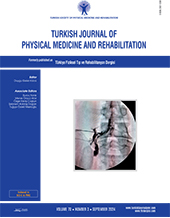Clinical effect of acupuncture on knee osteoarthritis and its effect on p38 MAPK signaling pathway
2 Department of Acupuncture and Moxibustion, The First Affiliated Hospital of Nanjing University of Chinese Medicine, Nanjing, China DOI : 10.5606/tftrd.2024.13186 Objectives: This study aims to investigate the curative efficacy of acupuncture on knee osteoarthritis (KOA) and its improvement on related scores and blood indexes.
Patients and methods: Between January 2019 and January 2020, a total of 108 patients (48 males, 60 females; mean age: 61.0±6.8 years; range 43 to 79 years) with KOA were randomly divided into control group (n=54) and patient group (n=54). Both groups received standard treatment, including adequate rest and exercise and oral celecoxib capsules. The patient group performed acupuncture operations on the Inner knee eye (EX-LE4), outer knee eye (EX-LE5), Yanglingquan (GB34), and Zusanli (ST36). In the control group, three non-acupuncture points were determined for sham acupuncture. The level of Michel Lequesne index of severity for osteoarthritis (ISOA) score, Visual Analog Scale (VAS), Lysholm Knee Score Scale (LKSS), erythrocyte sedimentation rate (ESR), C-reactive protein (CRP), interleukin-1beta (IL-1β), IL-6, transforming growth factor-beta (TGF-β), insulin-like growth factor-1 (IGF-1), fibroblast growth factor-2 (FGF-2) and p38 mitogen-activated protein kinase (p38 MAPK) were compared before and after treatment.
Results: The reduction of inflammatory markers in the patient group was greater than that in the control group after treatment. The levels of cytokines such as TGF-β, IGF-1, and FGF-2 were significantly increased after treatment, and the levels in the patient group were higher than those in the control group during the same period. In addition, p38 MAPK messenger ribonucleic acid (mRNA) was significantly downregulated after treatment, and the level in the patient group was lower than that in the control group during the same period.
Conclusion: Acupuncture combined with standard treatment can effectively promote the relief of symptoms and the improvement of knee joint function and effectively inhibit the expression of p38 MAPK signaling pathway.
Keywords : Acupuncture; inflammation; knee osteoarthritis; p38 MAPK signaling pathway
















